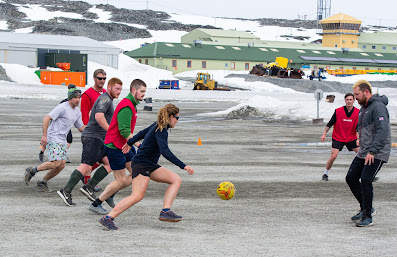A Tribute
Studying Marine Biology has opened so many doors in the way of pursuing a career I am wholly excited about. During my first year at Plymouth University, one of our professors, John Spicer, gave an incredibly vivid and interesting talk about his research on the physiology of Antarctic Amphipods. He filled his presentation with photos and detailed stories about life on a research base which completely captivated me. I remember rushing home to begin a search about what I would need to do to be a scientist at the British Antarctic Survey (BAS).
I later met Marlon Clark in my second year of university whilst diving for the Community Seagrass Initiative project (led by an incredibly patient and caring Mark Parry). Little did I know Marlon was soon to become my role model as he later went on to being selected for the Marine Assistant position with BAS immediately after his bachelors. My dream for working in Antarctica suddenly seemed achievable. I became increasingly fixated by the white continent and practically told every new person I met during a series of placements that this was my goal.
In my final year, Zoe Waring (also a Plymouth graduate) reaffirmed this when she so gracefully presented her experience as a Marine Assistant, this was just before she was due to return as an assistant once more to Antarctica. By this time, I was getting updates and post from Marlon in Antarctica and my application was underway. I went to visit my course mate, Lucy Jupe, where she was working as a research assistant at the British Antarctic Survey's headquarters in Cambridge. I would like to thank everyone who gave input to my application which resulted me obtaining two interviews for the Marine Assistant and the Marine Biologist position. Plymouth Universities diving manager, Keiron Fraser, was so forthcoming and generous with his time in helping me to prepare for the interviews, he shined with enthusiasm for Antarctica. Despite not being successful the first time round, I was consequently even more motivated when I came to apply for only the Marine Biologist position this year.
Having had time to work in a brilliant and vibrant research group at the Marine Biological Association, in the time between leaving university and re-applying, certainly built my confidence and affirmed to me that research was the career I wanted to pursue. Being surrounded by marine biologists such as the likes of Cat Wilding never gets boring! I am particularly grateful to Dan Smale and Katie Smith who so kindly gave me a blasting mock interview practice. Special thanks must go to my sister and Dad, Juliette and Fabien Frontier who were there for me every step of the way. Due to the Covid restrictions, this years interview was conducted on Zoom and three days later I got the call giving me the job! Who better to celebrate with than Dan Smale (also a previous employee of BAS) and a wonderful PhD student Nora Salland. We sat drinking beer on the grass and I was absolutely elated.
The weeks preceding were full of excitement and fun with extremely supportive family, friends and colleagues. Here is a wonderful card that Sophie Corrigan painted for me, I think she anticipated my job perfectly- with a lack of facial features due to frostbite?
I got a bit carried away and felt as if I was writing the acknowledgements of a book. I hope the everyone coped! To conclude with this trend, I extend my gratitude to Andy Foggo who has been an incredibly supportive supervisor and mentor who I look up to. Finally, I would not be in the position I am today without the opportunities provided by Plymouth Universities Marine Station. This is a photo of Charlie Sandercock (one of many excellent diving teachers) and I after one of many dives in Plymouth Sound.












Great start. I'm looking forward to reading the rest of your adventures. And hearing about them when you get back. Be careful! It's an unforgiving place.
ReplyDeleteHaha thank you John! I've started to realise as I read 'Freeze Frame' by Doug Allan
DeleteI hope this comment gets me into your Blog Nadia. I really do want to follow your adventures. I am bursting to go to Antarctica myself one day because I have an ambition to see all the world's species of penguins (17/18 I think depending on whose classification you believe). I have seen 4 so far (Galapagos, Little blue, yellow-eyed and African). I must go to S. New Zealand for a few more of them - Snares and Fjordland but I also know that I must go to the Falklands and Antarctica to see many of the others. Perhaps you can do a virtual penguin count for me? (Species rather than individuals)! Stay warm!
ReplyDeleteNadia, just reading your blog again reminds me of the first time you and I spoke about what you wanted to do in life and what uni path you should follow to get there. Marine biologist and Plymouth uni soon came out on top of all the options and you never looked back. What a worthwhile investment of your time and passion this has been!
ReplyDeleteThank you for being part of the community of people who look after our beautiful planet.
Your dad xx
Beautiful and inspiring — I love how this post shares your journey and gratitude as you follow your dream of becoming a marine biologist, celebrating every step toward working in Antarctica.”
ReplyDeleteEco Hero Nusa